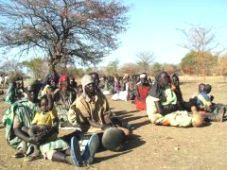UN calls on Sudan to send food aid to Darfur
May 9, 2006 (KHARTOUM) — The U.N. humanitarian chief called on Sudan to send food aid to the conflict-torn Darfur region, saying Tuesday that promised international aid would not reach there in time to stave off imminent shortages.
 Jan Egeland spoke to reporters in Khartoum after returning from a tour of the western region that was marred by rioting by refugees during a visit to their camp. The refugees attacked a translator in Egeland’s entourage, believing he was with the feared Janjaweed militia, then killed a translator working for African Union peacekeepers.
Jan Egeland spoke to reporters in Khartoum after returning from a tour of the western region that was marred by rioting by refugees during a visit to their camp. The refugees attacked a translator in Egeland’s entourage, believing he was with the feared Janjaweed militia, then killed a translator working for African Union peacekeepers.
The violence highlighted the continued tensions in Darfur even after a peace deal reached last week aimed at ending nearly three years of violence that has driven some 2 million people from their homes.
Egeland on Tuesday urged the Khartoum government to accept U.N. peacekeepers in Darfur saying it was “so strongly in Sudan’s interest.”
He said people should not look at these forces as a Western miliitary presence in Sudan, but as a United Nations force “including African, Asians, Arab, Muslims Christians and possibly with European and Americans.”
Sudan has said the peace deal could open the way for a U.N. deployment, which it has long resisted. Some 7,000 African Union peacekeepers are in Darfur, but they are severely understaffed and underequipped, and fighting has continued in past months.
Egeland warned that Darfur is facing food shortages over the next five months because of the rainy season and that Western donations will take time to reach the region. “This year, donors were too late,” he said, adding that some had been unaware of the problems raised by the rainy season, when
“I have come with a strong appeal to the govenment” to provide food aid from its strategic stocks to get through “this crucial hunger gap.” He said some 40,000 tons a month were needed.
Some 200,000 people have been killed in Darfur — either by violence or by disease and famine — since ethnic African rebels rose up in early 2003, accusing the Arab-led Khartoum government of discrimination. The Janjaweed, an Arab militia, is accused of killing and rapes in attacks on ethnic African villages in the region. Khartoum denies charges that it backs the militia.
(ST/AP)
